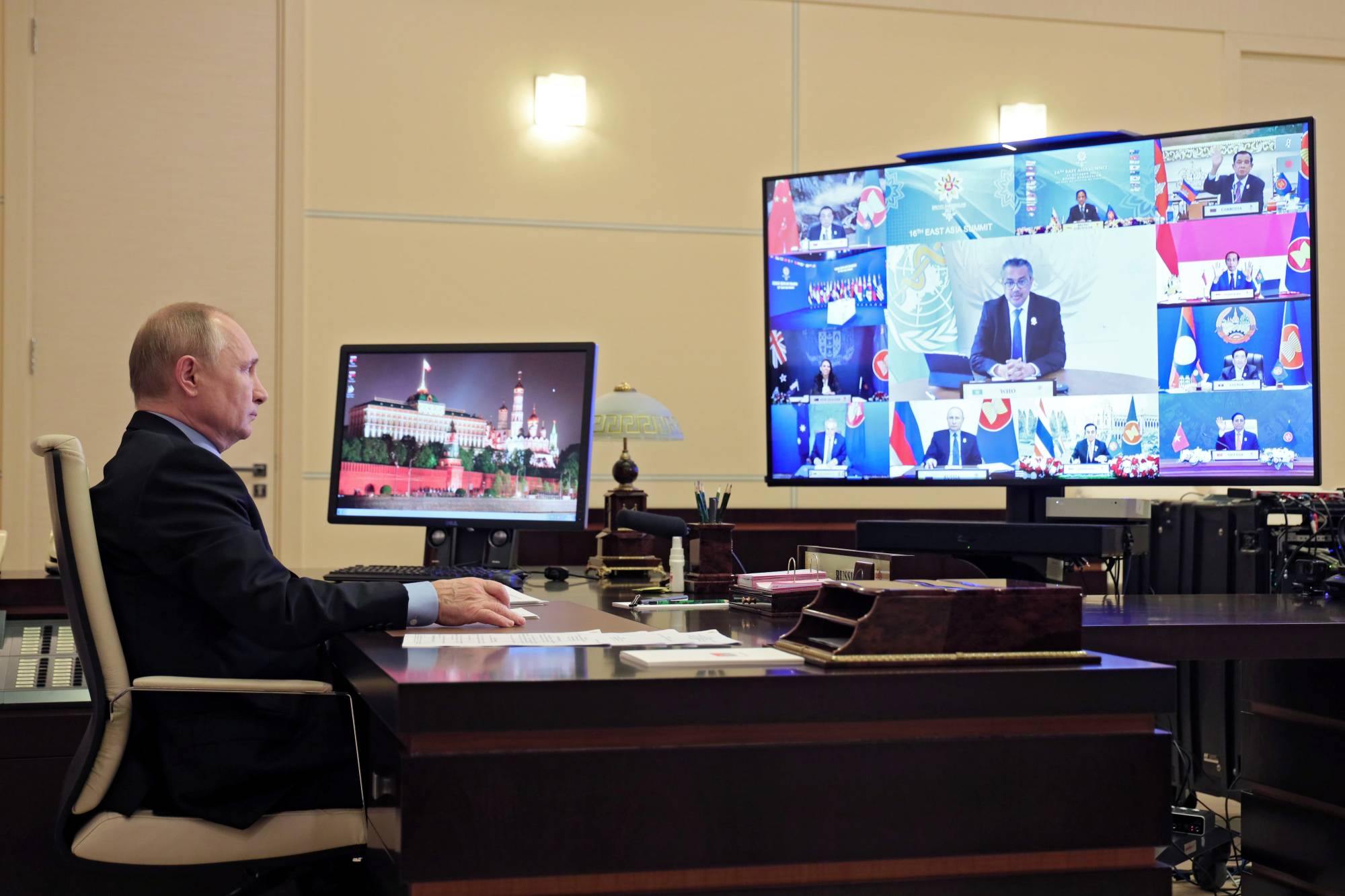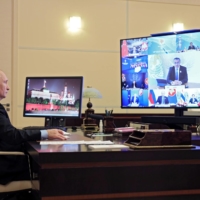Russia’s attack on Ukraine seems to have united Europe and many other democracies in the West, which were until fairly recently squabbling over trade, defense agreements, COVID-19 policies and other issues.
European countries and the United States have consulted closely over their response to Russia’s incursion, putting together a range of tough measures against Moscow that includes cutting Russian businesses off from much of the global financial system, banning Russian planes from much of the airspace over Europe and North America, and introducing heavy sanctions. What’s more, the member states of the North Atlantic Treaty Organization are sending weapons into Ukraine, including rocket launchers and surface-to-air missiles.
In many ways, the Ukraine conflict seems like a defining moment in which democracies could band together against an authoritarian power. But while the hostilities have sparked greater unity in the West, the reactions in Asia, even among Asian democracies, have been mixed, suggesting that Washington, Paris and Berlin cannot take for granted that democratic countries around the world will necessarily unite because of the Ukraine invasion.
To be sure, Russia still retains close links to a few countries in Asia, but these are mostly authoritarian states. It has equipped the Myanmar junta, which has subsequently praised Russia’s actions in Ukraine. Myanmar has cultivated its closest relationship with China since the early days of the Cold War. Moscow also retains ties to Vietnam, which has drawn closer to the United States strategically but still is reliant on Russian arms for much of its weaponry.
In contrast, some democracies in Asia — specifically Japan, Singapore, Taiwan and Australia — have responded in a similar fashion to their European peers, introducing international sanctions on Moscow and rhetorically slamming Russia.
Singapore’s government released a statement saying it “strongly condemns any unprovoked invasion of a sovereign country under any pretext.”
Taiwan, of course, fearful that it could wind up one day facing the same fate as Ukraine, has strongly backed Kyiv. The two do not have formal diplomatic ties, but Taiwanese leaders have praised Ukraine and Taiwan President Tsai Ing-wen has donated a month of her salary to relief efforts in Ukraine.
Yet some Asian countries have neither praised the Russian war effort nor joined tough measures against it. Alienated by the United States’ own democratic problems and protective of their own strategic interests, these states have been cautious about condemning Russia — and, by extension, China — and have waffled in their responses.
Democratic India, for instance, abstained from a U.N. resolution that condemned Russia’s aggression against Ukraine — despite having a sour relationship with China. India may have abstained because it also relies on Russian military hardware. However, the administration of Prime Minister Narendra Modi also might have abstained because it feels that, with U.S. power on the decline, India and other developing world powers — democracies and autocracies alike — should work together and not automatically follow resolutions proposed by Western states.
Other large Asian democracies — Indonesia, Thailand, Pakistan and the Philippines — have been circumspect at best about openly criticizing Moscow. They may fear that condemning Russia might cost them weapons and possibly gas in the future, or see little upside to joining any coordinated effort on sanctions. Indeed, some may even see a double standard in effect, remembering that the United States fought a war of choice in Iraq.
These Asian nations may also view the Ukraine conflict as somewhat irrelevant to their region. And, some Asian leaders, including Philippines President Rodrigo Duterte, apparently see Russian President Vladimir Putin as a model of a kind of strongman they desire to be.
Pakistani Prime Minister Imran Khan, for instance, visited Putin in Moscow shortly after the Ukraine invasion began, and reportedly exclaimed, “What a time to come, so much excitement” upon arriving. Pakistan, which played a central role in the Cold War, does not want to become caught up in a new conflict between Russia and the West, and probably fears the economic downturn of any conflict for developing countries.
Indonesia, meanwhile, which has had a longstanding tradition of trying to preserve its neutrality in major world affairs, has just issued tepid calls for peace.
Thailand, a U.S. treaty ally but a country that has become much closer strategically and economically to China in recent years and rarely wants to take a firm stance on any issue, has issued similarly bland statements about hostilities in the Ukraine.
Meanwhile, the Association of Southeast Asian Nations, has issued a moderate statement for “all parties concerned to exercise maximum restraint (and) to pursue dialogue through all channels.” ASEAN, which is guided by principles of consensus and noninterference, has shown its reluctance to do much even to halt violence in one of its own member-states, Myanmar. For the bloc to suddenly take a tough line on the Ukraine crisis would be completely out of ASEAN’s character.
U.S. and European officials continue to push countries such as Pakistan and Southeast Asian states to condemn Moscow’s actions and possibly even join international sanctions.
However, given the lukewarm responses on the crisis in Europe so far from most South and Southeast Asian democracies, Western leaders are unlikely to make much headway. Democratic principles may unite these states, but hard strategic interests and a history of noninterference in other nations’ affairs divide them as well.
Joshua Kurlantzick is a senior fellow for Southeast Asia at the Council on Foreign Relations.


















With your current subscription plan you can comment on stories. However, before writing your first comment, please create a display name in the Profile section of your subscriber account page.